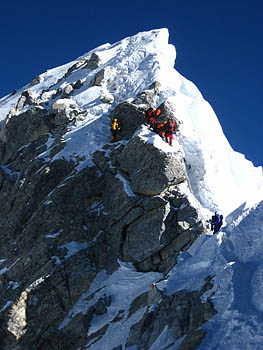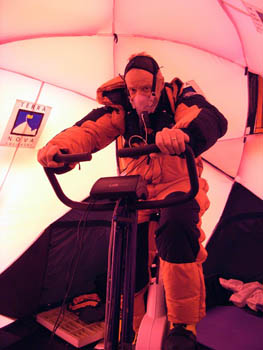 Mountains return to our televisions tomorrow with the first part of Horizon’s documentary on the Caudwell Xtreme Everest expedition.
Mountains return to our televisions tomorrow with the first part of Horizon’s documentary on the Caudwell Xtreme Everest expedition.
The programme promises to give an insight into why a team of medics risked their lives on the ascent of the world’s highest peak to further scientific knowledge.
Xtreme Everest climbers tackle the Hillary Step, one of the last obstacles before the summit of the mountain
More than 250 people took part in the project which was set up to help advance techniques and knowledge of the treatment of patients in intensive-care units. The expedition involved setting up the highest ever medical laboratory and shipping 26 tons of scientific equipment into the Himalayas.
Horizon producer Rob Liddell and his crew followed the doctors as they set up tented laboratories high on the ice and rock, carrying out a range of experiments on each other, observing minute changes to blood cells and tissues and pushing themselves to exhaustion on exercise bikes.
 Expedition leader Dr Mike Grocott, a specialist in critical-care medicine at University College London, said: “All the people that we see who are sick have hypoxia in some form or another.
Expedition leader Dr Mike Grocott, a specialist in critical-care medicine at University College London, said: “All the people that we see who are sick have hypoxia in some form or another.
“They have low oxygen levels because their heart isn't working so well, isn't pumping the blood around the body, or their lungs aren't working so well so that the oxygen isn't getting into the body.
“It's hard to think of a sick patient who doesn't have problems with hypoxia. Yet it's extraordinarily difficult to study them.”
While filming the expedition, the team took part in the treatment of Usha Bista, a Nepali woman, found alone and unconscious with severe altitude sickness at 8,000m on the South Col. Dr Andre Vercueil was forced to leave the team to bring her down to safety. Without the Xtreme Everest expedition’s intervention, her death would have been likely.
The programme can be seen on BBC2 at 8pm, with the second part broadcast the following Sunday.
- grough will be carrying an interview with one of the expedition participants shortly